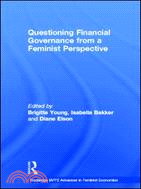Questioning Financial Governance from a Feminist Perspective
商品資訊
系列名:Routledge Iaffe Advances in Feminist Economics
ISBN13:9780415676700
出版社:Routledge UK
作者:Edited by Brigitte Young; Isabella Bakker and Diane Elson
出版日:2011/08/01
裝訂/頁數:平裝/184頁
規格:23.4cm*15.6cm (高/寬)
版次:1
定價
:NT$ 2999 元優惠價
:90 折 2699 元
無庫存,下單後進貨(到貨天數約45-60天)
下單可得紅利積點:80 點
商品簡介
作者簡介
目次
相關商品
商品簡介
Questioning Financial Governance from a Feminist Perspective brings together feminist economists and feminist political economists from different countries located in North America and Europe to analyze the ‘strategic silence’ about gender in fiscal and monetary policy, and financial regulation. This silence reflects a set of assumptions that the key instruments of financial governance are gender-neutral. This often masks the ways in which financial governance operates to the disadvantage of women and reinforces gender inequality.
This book examines both the transformations in the governance of finance that predate the financial crisis, as well as some dimension of the crisis itself. The transformations increasingly involved private as well as public forms of power, along with institutions of state and civil society, operating at the local, national, regional and global levels. An important aspect of these transformations has been the creation of policy rules (often enacted in laws) that limit the discretion of national policy makers with respect to fiscal, monetary, and financial sector policies. These policy rules tend to have inscribed in them a series of biases that have gender (as well as class and race-based) outcomes. The biases identified by the authors in the various chapters are the deflationary bias, male breadwinner bias, and commodification bias, adding two new biases: risk bias and creditor bias.
The originality of the book is that its primary focus is on macroeconomic policies (fiscal and monetary) and financial governance from a feminist perspective with a focus on the gross domestic product and its fluctuations and growth, paid employment and inflation, the budget surplus/deficit, levels of government expenditure and tax revenue, and supply of money. The central findings are that the key instruments of financial governance are not gender neutral. Each chapter considers examples of financial governance, and how it relates to the gender order, including divisions of labour, and relations of power and privilege.
This book is key reading for anyone studying feminist economics, and should also be of interest to those researching macroeconomics, political economics and women’s studies.
This book examines both the transformations in the governance of finance that predate the financial crisis, as well as some dimension of the crisis itself. The transformations increasingly involved private as well as public forms of power, along with institutions of state and civil society, operating at the local, national, regional and global levels. An important aspect of these transformations has been the creation of policy rules (often enacted in laws) that limit the discretion of national policy makers with respect to fiscal, monetary, and financial sector policies. These policy rules tend to have inscribed in them a series of biases that have gender (as well as class and race-based) outcomes. The biases identified by the authors in the various chapters are the deflationary bias, male breadwinner bias, and commodification bias, adding two new biases: risk bias and creditor bias.
The originality of the book is that its primary focus is on macroeconomic policies (fiscal and monetary) and financial governance from a feminist perspective with a focus on the gross domestic product and its fluctuations and growth, paid employment and inflation, the budget surplus/deficit, levels of government expenditure and tax revenue, and supply of money. The central findings are that the key instruments of financial governance are not gender neutral. Each chapter considers examples of financial governance, and how it relates to the gender order, including divisions of labour, and relations of power and privilege.
This book is key reading for anyone studying feminist economics, and should also be of interest to those researching macroeconomics, political economics and women’s studies.
作者簡介
Brigitte Young is Professor of Political Science at the University of Münster, Germany.
Isabella Bakker is Professor of Political Science and Women’s Studies at York University, Toronto, Canada.
Diane Elson is Professor of Sociology at the University of Essex, UK.
Isabella Bakker is Professor of Political Science and Women’s Studies at York University, Toronto, Canada.
Diane Elson is Professor of Sociology at the University of Essex, UK.
目次
Introduction Brigitte Young, Isabella Bakker and Diane Elson 1. Macroeconomics and gender orders in OECD countries Friederike Maier 2. Changing macroeconomic governance and gender orders: the case of Canada Isa Bakker 3. EU macroeconomic governance and gender orders: the case of Austria Elizabeth Klatzer and Christa Schlager 4. Taxation, employment and gender: the case of state taxes in the USA Elissa Braunstein and Caren Grown 5. Central banks, employment and gender in developing countries Elissa Braunstein and James Heintz 6. IMF policies and gender orders: the case of the Poverty Reduction and Growth Facility Diane Elson and Tonia Warnecke 7. The role of gender in governance of the financial sector Helene Schuberth and Brigitte Young 8. Macroeconomic governance, gendered inequality, and global crises Stephen Gill and Adrienne Roberts
主題書展
更多
主題書展
更多書展今日66折
您曾經瀏覽過的商品
購物須知
外文書商品之書封,為出版社提供之樣本。實際出貨商品,以出版社所提供之現有版本為主。部份書籍,因出版社供應狀況特殊,匯率將依實際狀況做調整。
無庫存之商品,在您完成訂單程序之後,將以空運的方式為你下單調貨。為了縮短等待的時間,建議您將外文書與其他商品分開下單,以獲得最快的取貨速度,平均調貨時間為1~2個月。
為了保護您的權益,「三民網路書店」提供會員七日商品鑑賞期(收到商品為起始日)。
若要辦理退貨,請在商品鑑賞期內寄回,且商品必須是全新狀態與完整包裝(商品、附件、發票、隨貨贈品等)否則恕不接受退貨。
























